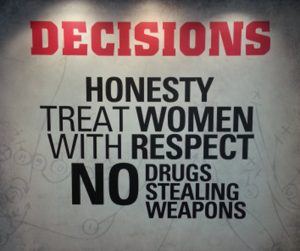by Shawn Crawford

Oatmeal for breakfast. Kale salad for lunch. Surely a slice of pie with dinner won’t ruin the diet after you’ve been so disciplined all day?
Welcome to Moral Licensing, the term psychologists and researchers use to describe the process by which we use a “good” behavior to later justify a “bad” choice. Example? I voted for Obama, so let the racist remarks begin! Obviously the strategy proves more subtle, from Fox News insisting we had entered a post-racial society after President Obama’s election, to the refrain, “I don’t want to hear about racial inequality; we elected a black president.”
Moral licensing occurs in research studies regardless of age, gender, or economic situation. But what happens when religion gets introduced into the mix? In a study conducted by the neuroscientist Jean Decety, 1170 children aged 5-12 years old, from six countries (USA, Canada, China, Jordan, Turkey and South Africa) were given 30 stickers and asked to share as many as they liked with a child of similar age and background to create a “generosity score”. Most kids came from households that identified as Christian (24%), Muslim (43%) or not religious (28%).
The children from secular homes had the highest generosity scores. When parents were asked to score the empathy of their children in the study, the religious parents rated their children as very moral, far beyond the scores of the test.
To see just how powerful moral licensing can be in shaping behavior, consider that in a poll conducted by ChristiaNet.com, 50% of evangelical men and 20% of evangelical women said they were addicted to porn (which they consider sinful). The time of highest viewing? Sundays, after they had gone to church.
Last week saw the unfolding of moral licensing run amok in the case of Ohio State University football coach Urban Meyer. The program and Meyer live in the rarified air of elite college football that generates untold millions for everyone associated with it, except for the players, referred to as “student athletes” by the NCAA like a sacred chant to ward off evil and someone voiding their television contracts. The Wall Street Journal values Ohio State football at $1.5 billion. I assume Buckeye student athletes run around sacks of money to improve agility.
Meyer has long positioned himself as a paragon of virtue that does things the right way. He rails against those that cheat, declaring during the scandal that brought down Louisville basketball coach Rick Pitino, “I always believed if you willfully and intentionally broke the rule or you lie to the NCAA, you can never coach again. To this day, I still believe that.”
That quote occurred after Meyer’s return to coaching, having left a wildly successful University of Florida team that won two national championships with Football Jesus, Tim Tebow, at quarterback. Meyer had been suffering stress-related health issues, and proclaimed his desire to spend time with his family. He promptly accepted a job at ESPN and began flying all over the country. After reading a book called LEAD . . . For God’s Sake!, Meyer found the resolve and faith to sign a multi-million dollar contract to coach Ohio State.
Tebow’s pristine reputation covered a multitude of sins at Florida, including the tragic saga of Aaron Hernandez, who would later be convicted of murder while playing for the New England Patriots. Hernandez had been troubled from the start, punching and bursting the eardrum of a server at a bar his freshman year. Only the intercession of Tebow kept the incident from escalating further. Hernandez was also suspected in a shooting and other violent incidents.
Meyer could not be held accountable for any of this. He brought troubled players into his office for Bible studies; his wife made dinner for them in her home; his angelic children doted on them. The constant message Meyer projected was one of messianic goodness. Why report a player to police or suspend them from the team? If he couldn’t save them, no one else had a chance. There’s always a look on Meyer’s face when someone questions his authority or leadership: Why aren’t you thanking me for all I do?

While at Florida, Meyer had an assistant named Zach Smith, the grandson of legendary Ohio State coach Earle Bruce and Meyer’s mentor. In 2009, Smith was arrested for assaulting his pregnant wife Courtney. The charges were later dropped for insufficient evidence as Courtney would not press the case further. She now claims members of Meyer’s staff pressured her to drop the charges.
When Meyer moved to Ohio State in 2012, he brought Smith with him as an assistant coach, not reporting the alleged abuse to the university. Zach and Courtney Smith would separate in 2015, and a long period of harassment and abuse allegations would begin including Courtney calling and visiting the Powell, Ohio police in 2015 to file a report and have photographs taken of bruises. No files were charged. This entire story has a constant undercurrent of the police deferring and protecting institutions and men over the abuse of women. The domestic violence would culminate in a restraining order and finally an order of protection against Zach Smith. In May of this year, Smith was arrested for violating the restraining order.
Journalist Brett McMurphy posted a story on July 23 recounting the long history of abuse Courtney Smith had suffered. Zach Smith suddenly found himself fired by the end of the day. Meyer had to make an appearance at Big Ten media day on the 24th where he claimed the 2009 abuse had been resolved, and he knew nothing of the 2015 incidents and raked McMurphy over the coals, wondering, “I don’t know who creates a story like that.” He did have time to remind everyone what a shining example he had been in 2009, counseling Zach and Courtney with his wife Shelly and putting them on the righteous path.
Oops, never mind. Faced with the prospect that he had failed to properly report a domestic violence incident to the university and could lose his job, Meyer suddenly remembered he had known about the 2015 events, had reported them to the letter of law, and you would just have to excuse his earlier lying on the matter. The type of lying he proclaimed should get one barred from coaching forever. Just a little misunderstanding.
Meyer received administrative leave, the obligatory panel to find the truth was formed, and each day offered up new revelations about Zach Smith. A DUI arrest; an affair with an Ohio State staff member; lewd pictures being taken in the White House during a visit to celebrate their national championship; a $600 trip to a strip club during a recruiting trip at which high school coaches might have been present (Also present, Tom Herman, current Texas coach, rumored to have tipped McMurphy off to the Smith story because he was peeved about losing a prized recruit to Ohio State. Stay classy, Tom.); sex toys delivered to his office on campus. Meyer’s virtuous influence must have been getting short-circuited somehow.
The final report issued by the blue-ribbon panel detailed Meyer asking how to delete texts from his phone and then clearly doing so, discussing the Smith abuse with his wife Shelly, a friend and confidante of Courtney, and generally failing to put an end to a dangerous situation he had full knowledge of for years. The panel builds an enormously damning case and then concludes with an, oh well, Urban says he respects women and sounds real sincere. Apparently the members went to the Guys and Dolls School of Investigation.
Reports surfaced that when the Board of Trustees and the University President Michael V. Drake met to consider the report, Meyer informed them that they had the power to fire him but that he would accept no punishment other than his current leave because he had done nothing wrong. This breathtaking declaration of self-righteousness warranted ten hours of deliberation until Meyer finally deigned to agree to a three-game suspension. I was reminded that once, while waiting for the deliberately late General MacArthur, President Truman remarked that the general must be having difficulty getting down from his cross.
When asked at the press conference after the suspension if he had a message for Courtney Smith, Meyer replied, “I’m sorry that we’re in this situation.” At every turn, Meyer makes sure that everyone understands that he has been wronged, that his spotless reputation has been under siege. In typical Meyer fashion, two days later he released a statement quickly apologizing to Courtney Smith and then extolling his unending respect and protection of women over the years. The passion of the Urban never ends.
We have entered a strange moment in culture where moral licensing finds ever greater ludicrous expressions as we trumpet even the smallest good deed with a blaring moral selfie proclaiming our uprightness. The constant self-congratulation enable us to justify even the most despicable acts.
Meyer’s faith adds the potent ingredient of divine approval to the stew. There’s nothing left to question when God has endorsed your every decision and action. I grew up with a host of Urban Meyers, so sure in their rightness, so ready to judge the least failing of others, so oblivious to their own hypocrisy and immorality.
In 1848, John Humphrey Noyes founded the Oneida Community, a commune that wed moral licensing with divine approbation in the most fascinating of ways. Noyes and his followers believed in Perfectionism, the belief that once you were cleansed of your sins by Christ every action thereafter became permissible and good because you could not choose otherwise. Noyes’ particular brand of Perfectionism derived from an argument that Jesus had returned to earth in 70AD so we already had attained the Heavenly Kingdom on earth if we would just embrace it.
Like many religious communes in the 19th Century, the embracing Noyes most wanted to focus on involved sex. The group practiced complex marriage, a euphemism for Free Love, and Noyes wanted that freedom to begin at younger and younger ages until the entire experiment fell apart when a power struggle broke out between his son as chosen successor and another member of the community John Tower. All that remained after 1881 was Oneida Limited, the silverware company the commune formed to help support themselves.
A strange vestige of Perfectionism informs our politics and culture today. Evangelicals have narrowed right living down to the single issue of abortion; working to abolish it justifies any action, any candidate, any prejudice and any violence that comes along for the ride. The Catholic church has extended the idea of infallibility to include not just the pope but the entire clergy, and a system of denial and demonization must be unleashed against any victim that attempts to pierce that veil. In this world, my singular faith negates any other consideration of rights, equality, fairness, or ethical consideration for anyone else because I have attained moral perfection.
I doubt that Meyer understands any of this beyond the certainty that he lives, like the title of his 2015 book, Above the Line. Residing there on his lofty perch, any mayhem or awfulness that might occur below him is none of his concern, and more importantly, never his fault.
